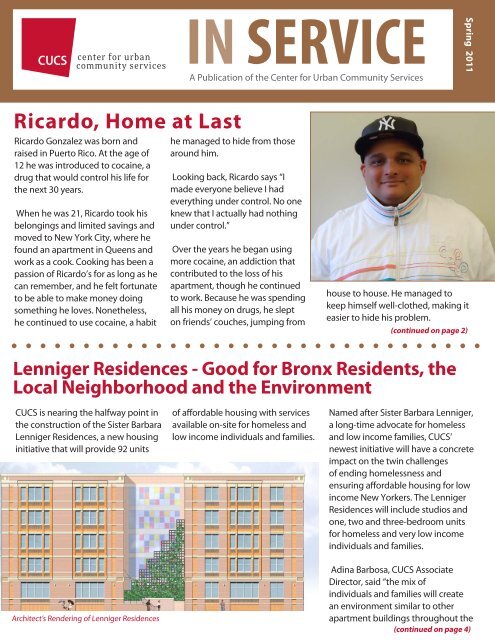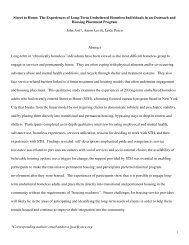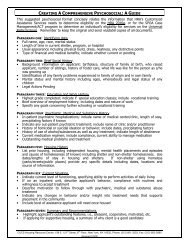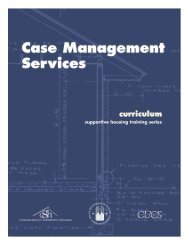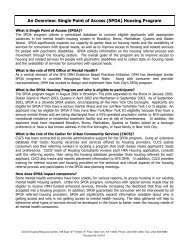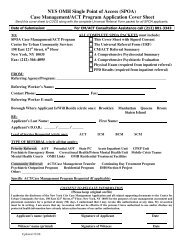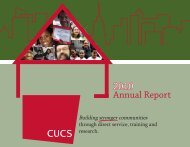Ricardo, Home at Last - Center for Urban Community Services
Ricardo, Home at Last - Center for Urban Community Services
Ricardo, Home at Last - Center for Urban Community Services
You also want an ePaper? Increase the reach of your titles
YUMPU automatically turns print PDFs into web optimized ePapers that Google loves.
IN SERVICE<br />
A Public<strong>at</strong>ion of the <strong>Center</strong> <strong>for</strong> <strong>Urban</strong> <strong>Community</strong> <strong>Services</strong><br />
Spring 2011<br />
<strong>Ricardo</strong>, <strong>Home</strong> <strong>at</strong> <strong>Last</strong><br />
<strong>Ricardo</strong> Gonzalez was born and<br />
raised in Puerto Rico. At the age of<br />
12 he was introduced to cocaine, a<br />
drug th<strong>at</strong> would control his life <strong>for</strong><br />
the next 30 years.<br />
When he was 21, <strong>Ricardo</strong> took his<br />
belongings and limited savings and<br />
moved to New York City, where he<br />
found an apartment in Queens and<br />
work as a cook. Cooking has been a<br />
passion of <strong>Ricardo</strong>’s <strong>for</strong> as long as he<br />
can remember, and he felt <strong>for</strong>tun<strong>at</strong>e<br />
to be able to make money doing<br />
something he loves. Nonetheless,<br />
he continued to use cocaine, a habit<br />
he managed to hide from those<br />
around him.<br />
Looking back, <strong>Ricardo</strong> says “I<br />
made everyone believe I had<br />
everything under control. No one<br />
knew th<strong>at</strong> I actually had nothing<br />
under control.”<br />
Over the years he began using<br />
more cocaine, an addiction th<strong>at</strong><br />
contributed to the loss of his<br />
apartment, though he continued<br />
to work. Because he was spending<br />
all his money on drugs, he slept<br />
on friends’ couches, jumping from<br />
house to house. He managed to<br />
keep himself well-clothed, making it<br />
easier to hide his problem.<br />
(continued on page 2)<br />
Lenniger Residences - Good <strong>for</strong> Bronx Residents, the<br />
Local Neighborhood and the Environment<br />
CUCS is nearing the halfway point in<br />
the construction of the Sister Barbara<br />
Lenniger Residences, a new housing<br />
initi<strong>at</strong>ive th<strong>at</strong> will provide 92 units<br />
Architect’s Rendering of Lenniger Residences<br />
of af<strong>for</strong>dable housing with services<br />
available on-site <strong>for</strong> homeless and<br />
low income individuals and families.<br />
Named after Sister Barbara Lenniger,<br />
a long-time advoc<strong>at</strong>e <strong>for</strong> homeless<br />
and low income families, CUCS’<br />
newest initi<strong>at</strong>ive will have a concrete<br />
impact on the twin challenges<br />
of ending homelessness and<br />
ensuring af<strong>for</strong>dable housing <strong>for</strong> low<br />
income New Yorkers. The Lenniger<br />
Residences will include studios and<br />
one, two and three-bedroom units<br />
<strong>for</strong> homeless and very low income<br />
individuals and families.<br />
Adina Barbosa, CUCS Associ<strong>at</strong>e<br />
Director, said “the mix of<br />
individuals and families will cre<strong>at</strong>e<br />
an environment similar to other<br />
apartment buildings throughout the<br />
(continued on page 4)
<strong>Ricardo</strong>, <strong>Home</strong> <strong>at</strong> <strong>Last</strong> - continued<br />
Eventually, however, he lost all<br />
semblance of control and exhausted<br />
his welcome among friends. He<br />
stopped jumping from house to house<br />
and moved under a bridge on the<br />
East River in Harlem. Embarrassed<br />
and withdrawn, <strong>Ricardo</strong> shunned all<br />
interaction, felt a sense of loss, and<br />
didn’t know how to cope. Struggling to<br />
maintain his drug habit, he moved to<br />
the Harlem River Park in East Harlem.<br />
This became his home <strong>for</strong> the next 14<br />
months.<br />
In April, 2010, while sitting on a park<br />
bench, he met Jerome Bivens from<br />
CUCS’ Street to <strong>Home</strong> Program. For<br />
the next two months, Jerome and the<br />
outreach team continually worked to<br />
find <strong>Ricardo</strong> and talk to him about the<br />
help CUCS could offer him. <strong>Ricardo</strong> felt<br />
th<strong>at</strong> Jerome and the outreach team<br />
worked really hard to stay with him,<br />
“they were everywhere”, he explains.<br />
He began to look <strong>for</strong>ward to seeing<br />
them and even began to seek them<br />
out. He finally accepted the offer<br />
of help and explains his decision as<br />
“I believed in life and God and was<br />
convinced if I could believe in myself, I<br />
could have a better life.”<br />
Jerome got <strong>Ricardo</strong> a room <strong>at</strong> the<br />
Harlem YMCA. After a month and<br />
a half <strong>Ricardo</strong> received a call from<br />
CUCS telling him there was an<br />
opening <strong>at</strong> CUCS’ Kelly Transitional<br />
Living <strong>Community</strong>, a transitional<br />
housing program <strong>for</strong> chronically<br />
homeless adults. At the Kelly, <strong>Ricardo</strong><br />
worked with his case manager,<br />
Allison Wiltshire, who he says is<br />
really knowledgeable and was able<br />
to connect him with the services he<br />
needed. They worked together to<br />
address his addiction to cocaine.<br />
<strong>Ricardo</strong> began working with Dr.<br />
Joanna Fried, a Psychi<strong>at</strong>rist from CUCS’<br />
Project <strong>for</strong> Psychi<strong>at</strong>ric Outreach to the<br />
<strong>Home</strong>less (PPOH). As they worked to<br />
develop a personalized plan <strong>for</strong> his<br />
recovery. <strong>Ricardo</strong> also explained th<strong>at</strong><br />
earlier in his life he was diagnosed<br />
with major depressive disorder. Based<br />
on his symptoms, however, Dr. Fried<br />
suspected his diagnosis might be<br />
bipolar disorder. (A bipolar disorder is a<br />
mood disorder th<strong>at</strong> expresses itself as<br />
irregular and cyclical changes in mood,<br />
energy, and thinking. According to the<br />
N<strong>at</strong>ional Institute of Mental Health,<br />
bipolar disorder affects 5.7 million<br />
American adults every year. Substance<br />
abuse frequently accompanies the<br />
illness).<br />
Jerome worked with Dr. Fried to<br />
understand his illness, how his<br />
symptoms affect him and techniques<br />
<strong>for</strong> controlling them. <strong>Ricardo</strong> says<br />
<strong>for</strong> him bipolar disorder means “not<br />
having control of your emotions”,<br />
“being an impulsive person”, and<br />
“not thinking about consequences”.<br />
<strong>Ricardo</strong> has come to understand and<br />
value th<strong>at</strong> people living with bipolar<br />
disorder can lead stable, full and<br />
productive lives and achieve their<br />
goals with proper tre<strong>at</strong>ment.<br />
<strong>Ricardo</strong> moved from CUCS’ Kelly into<br />
an apartment of his own in the Bronx.<br />
He is proud of his home and, most<br />
important, proud to say he has been<br />
sober and drug free <strong>for</strong> 9 months. He<br />
is linked to community-based services<br />
and also continues to see Dr. Fried. He<br />
is actively looking <strong>for</strong> a job, maintains<br />
his love <strong>for</strong> cooking, and his goal is to<br />
someday own a c<strong>at</strong>ering company.<br />
CUCS<br />
Board of Directors<br />
Chair<br />
Julie Sandorf<br />
President<br />
The Charles H. Revson Found<strong>at</strong>ion<br />
President<br />
Tony Hannigan<br />
Executive Director<br />
<strong>Center</strong> <strong>for</strong> <strong>Urban</strong> <strong>Community</strong> <strong>Services</strong><br />
Vice Chairman<br />
Daniel S. Bayer, Ph.D.<br />
Principal<br />
Bayer Consulting<br />
Treasurer<br />
Jerry Letter<br />
Partner & Chief Financial Officer<br />
InterMedia Partners<br />
Neal Cohen, MD<br />
Distinguished Lecturer<br />
Hunter College, School of Social Work<br />
Naveed Choudri<br />
Director of Equity Deriv<strong>at</strong>ives<br />
Marketing<br />
Credit Suisse Securities, LLC<br />
Angela Mia Colasuonno<br />
Director, Global Markets Division<br />
Sapient<br />
Emily Tabak Epstein<br />
Associ<strong>at</strong>e<br />
Simpson Thacher & Bartlett LLP<br />
Don D. Grubman, Esq.<br />
Partner<br />
Hahn & Hessen LLP<br />
Rosanne Haggerty<br />
President<br />
Common Ground N<strong>at</strong>ional<br />
P<strong>at</strong>ricia J. Kozu<br />
Managing Director, Finance &<br />
Administr<strong>at</strong>ion<br />
N<strong>at</strong>ional Employment Law Project<br />
Jack Krauskopf (Chair Emeritus)<br />
Distinguished Lecturer<br />
Baruch College, School of Public<br />
Affairs<br />
IN SERVICE | Spring 2011
Giving CUCS Clients Something Many of Us Take For<br />
Granted – A Choice<br />
Most adults can exercise some<br />
control over who will provide them<br />
professional or personal services,<br />
choosing among a landscape of<br />
physicians, lawyers, accountants,<br />
therapists, and others as needed.<br />
Typically, homeless and very<br />
low-income people do not have<br />
this option. Physicians, medical<br />
professionals, lawyers, social<br />
workers, case managers and others<br />
are assigned to help them, and<br />
the recipients of the services have<br />
limited if any say about who is<br />
appointed.<br />
CUCS’ work to reintegr<strong>at</strong>e homeless<br />
people back into society involves<br />
helping them with housing,<br />
employment and other tangibles,<br />
though helping to rebuild people’s<br />
self esteem and to empower them<br />
can be important as well. As such,<br />
CUCS recently piloted the Choice<br />
Initi<strong>at</strong>ive to test the feasibility of<br />
providing our service recipients with<br />
the ability to choose case managers.<br />
A <strong>for</strong>um of CUCS Program Directors<br />
grappled with the question: Why<br />
are we “assigning workers” and can<br />
we provide more choice? A robust<br />
deb<strong>at</strong>e included comments ranging<br />
from “it will be too complic<strong>at</strong>ed”,<br />
“hard to manage”, “not necessary”<br />
“wh<strong>at</strong> a gre<strong>at</strong> idea” and “let’s try it”.<br />
The pilot was conducted <strong>at</strong> the<br />
Schermerhorn, a permanent housing<br />
residence where CUCS provides case<br />
management and rel<strong>at</strong>ed services<br />
<strong>for</strong> 116 <strong>for</strong>merly homeless, special<br />
needs and low income individuals.<br />
The pilot tested giving tenants<br />
some choice over who would be<br />
his/her case<br />
manager. Each<br />
case manager was<br />
asked to prepare<br />
a short biography<br />
<strong>for</strong> distribution<br />
including<br />
in<strong>for</strong>m<strong>at</strong>ion<br />
on educ<strong>at</strong>ion,<br />
experience,<br />
work style and<br />
the reason he/<br />
she likes being<br />
a part of the<br />
Schermerhorn.<br />
Tenants were<br />
invited to a meet-and-greet session<br />
with prospective case managers to<br />
mingle and ask questions. After this<br />
session, each tenant completed a<br />
<strong>for</strong>m indic<strong>at</strong>ing their top choices and<br />
m<strong>at</strong>ches were made accordingly.<br />
According to Stacy M<strong>at</strong>uza,<br />
CUCS Program Director <strong>at</strong> the<br />
Schermerhorn, giving individuals<br />
a choice has benefits <strong>for</strong> service<br />
recipients and case managers.<br />
“This sent a powerful message<br />
th<strong>at</strong> people’s opinions count and<br />
th<strong>at</strong> they have a say in the services<br />
they receive <strong>at</strong> CUCS. For staff, it<br />
was challenging, instructive and<br />
refreshing <strong>for</strong> them to engage in a<br />
different way.” She adds, “Only good<br />
has come from the experience”.<br />
Given the popularity and success<br />
of the pilot, CUCS is taking the<br />
next step and moving the initi<strong>at</strong>ive<br />
across all of its permanent housing<br />
sites. Joe DeGenova, CUCS’ Deputy<br />
Director, who helped lead the<br />
thinking and implement<strong>at</strong>ion<br />
around the initi<strong>at</strong>ive, said “At<br />
CUCS we try to follow a simple but<br />
challenging rule regarding service<br />
delivery: tre<strong>at</strong> the tenants the way<br />
you would want to be tre<strong>at</strong>ed, or<br />
th<strong>at</strong> you would want one of your<br />
family members to be tre<strong>at</strong>ed. We<br />
would want to choose our case<br />
manager, so we want our tenants to<br />
be able to do the same. Through our<br />
discussions, we’ve come to think of<br />
this as a basic rights issue, and we<br />
think it will lead to more effective<br />
rel<strong>at</strong>ionships between tenants and<br />
their case manager.”<br />
A tenant named Dustin who has<br />
been given a choice sums it up the<br />
best: “I chose my first counselor,<br />
Ilana, based on her bio. I liked<br />
th<strong>at</strong> she had so much experience<br />
working with the homeless and<br />
the mentally ill—it made me feel<br />
confident in her. When I met her, I<br />
liked her personality and knew we<br />
would get along really well and th<strong>at</strong><br />
she would be a good help to me. I<br />
(continued on page 4)<br />
IN SERVICE | Spring 2011 3
Lenniger Residences - continued<br />
city, while meeting the community’s<br />
need <strong>for</strong> housing <strong>for</strong> its low income<br />
and homeless residents.”<br />
Loc<strong>at</strong>ed <strong>at</strong> 2007 and 2013 Hughes<br />
Avenue (<strong>at</strong> 179th Street) in the East<br />
Tremont section of the Bronx, the<br />
Lenniger Residences will promote<br />
community revitaliz<strong>at</strong>ion by<br />
making use of properties th<strong>at</strong> have<br />
remained vacant and under-utilized<br />
<strong>for</strong> several decades. The Lenniger<br />
Residences will serve as an anchor<br />
on the block and help the immedi<strong>at</strong>e<br />
neighborhood in its ongoing<br />
beautific<strong>at</strong>ion and safety ef<strong>for</strong>ts. The<br />
Lenniger Residences in Construction<br />
project will also include a community<br />
advisory board, meeting spaces,<br />
and enhance the area’s economic<br />
development.<br />
The Lenniger residences will also<br />
contain a number of green elements.<br />
With a generous $500,000 capital<br />
grant from Bronx City Council<br />
Member Joel Rivera, CUCS expects to<br />
achieve LEED (Leadership in Energy<br />
and Environmental Design) Silver<br />
certific<strong>at</strong>ion on the project. The<br />
building will also meet the Enterprise<br />
Green Communities criteria, the first<br />
n<strong>at</strong>ional green building program<br />
dedic<strong>at</strong>ed<br />
solely to<br />
af<strong>for</strong>dable<br />
housing and<br />
exceed the<br />
standards of<br />
the New York<br />
St<strong>at</strong>e Energy<br />
Research and<br />
Development<br />
Authority<br />
(NYSERDA)<br />
Energy Star<br />
Program.<br />
To meet the<br />
requirements<br />
<strong>for</strong> LEED Silver certific<strong>at</strong>ion, the<br />
Lenniger Residences will contain<br />
a number of green elements,<br />
including:<br />
• green roofs<br />
• EnergyStar appliances<br />
• Energy Star light fixtures in<br />
apartments<br />
• low flow w<strong>at</strong>er fixtures<br />
• green screens and plantings<br />
• energy efficient he<strong>at</strong>ing and<br />
cooling systems<br />
• 24-hour lighting controls <strong>for</strong><br />
stairwells and corridors<br />
By going green, CUCS will decrease<br />
utility costs while promoting<br />
sustainability and joining the<br />
movement against global clim<strong>at</strong>e<br />
change.<br />
CUCS’ Executive Director, Tony<br />
Hannigan, sums up: “Working closely<br />
with Bronx <strong>Community</strong> Board 6 and<br />
the NYC Department of Housing<br />
Preserv<strong>at</strong>ion and Development, we<br />
are building a housing initi<strong>at</strong>ive th<strong>at</strong><br />
advances our mission of ending<br />
homelessness and providing<br />
housing and opportunities <strong>for</strong> low<br />
income New Yorkers.”<br />
Giving CUCS Clients Something Many of Us Take For<br />
Granted – A Choice - Continued<br />
got to know her really well, and<br />
was sad when she left. I chose my<br />
new counselor because her bio was<br />
a lot like Ilana’s, which made me<br />
want to work with her. I like th<strong>at</strong> I<br />
can chose my counselor here <strong>at</strong> the<br />
Schermerhorn. Be<strong>for</strong>e I came to the<br />
Schermerhorn, I never had a choice.<br />
Most of the time it worked out<br />
okay, but it’s nice to be able to have<br />
a say in wh<strong>at</strong> counselor I work with.”<br />
IN SERVICE | Spring 2011 4
Project <strong>for</strong> Psychi<strong>at</strong>ric Outreach to the <strong>Home</strong>less<br />
Wins APA Award<br />
On October 14, 2010 the American<br />
Psychi<strong>at</strong>ric Associ<strong>at</strong>ion (APA)<br />
honored four outstanding mental<br />
health programs <strong>at</strong> an award<br />
present<strong>at</strong>ion <strong>at</strong> the opening session<br />
of the Institute on Psychi<strong>at</strong>ric<br />
<strong>Services</strong> in Boston. CUCS’ Project<br />
<strong>for</strong> Psychi<strong>at</strong>ric Outreach to the<br />
<strong>Home</strong>less (PPOH) received the<br />
APA’s Silver Achievement Award <strong>for</strong><br />
2010 in recognition of our ef<strong>for</strong>ts<br />
and innov<strong>at</strong>ive approach to bring<br />
psychi<strong>at</strong>ric services to homeless and<br />
<strong>for</strong>merly homeless adults.<br />
PPOH is the only program in the<br />
United St<strong>at</strong>es th<strong>at</strong> is exclusively<br />
dedic<strong>at</strong>ed to recruiting, employing,<br />
and training community<br />
psychi<strong>at</strong>rists to work with homeless<br />
and <strong>for</strong>merly homeless adults in<br />
nontraditional settings. As Van Yu,<br />
M.D., CUCS’ Medical Director and<br />
Program Director of PPOH, explains,<br />
“Psychi<strong>at</strong>ry is fundamental to<br />
tre<strong>at</strong>ing people who have a chronic<br />
mental illness and PPOH brings its<br />
services to many settings where<br />
psychi<strong>at</strong>rists would otherwise not be<br />
available.”<br />
PPOH serves about 3,000 New<br />
Yorkers every year.<br />
PPOH’s Dr. Van Yu<br />
CUCS Re-entry Program Receives N<strong>at</strong>ional Award<br />
CUCS’ Reentry Coordin<strong>at</strong>ion System<br />
(RCS) was honored with a n<strong>at</strong>ional<br />
leadership and collabor<strong>at</strong>ion award<br />
<strong>at</strong> the close of 2010. RCS is a unique,<br />
model program th<strong>at</strong> monitors and<br />
manages access to housing <strong>for</strong><br />
individuals <strong>at</strong> risk of homelessness<br />
with a serious mental illness who are<br />
being released from New York St<strong>at</strong>e<br />
prisons to New York City.<br />
RCS combines CUCS’ expertise<br />
in the housing arena and d<strong>at</strong>a<br />
management systems with our<br />
experience as a collabor<strong>at</strong>or among<br />
the various service systems working<br />
with mentally ill inm<strong>at</strong>es. In the past<br />
14 months, the project received<br />
254 applic<strong>at</strong>ions and has already<br />
placed 134 inm<strong>at</strong>es into permanent<br />
housing.<br />
The Reentry Coordin<strong>at</strong>ion System is<br />
funded by the federal government’s<br />
Projects <strong>for</strong> Assistance in Transition<br />
from <strong>Home</strong>lessness<br />
(PATH). CUCS manages<br />
the project <strong>for</strong> the<br />
New York St<strong>at</strong>e Office<br />
of Mental Health and<br />
was awarded the<br />
2010 PATH Exemplary<br />
Practice Award <strong>for</strong><br />
Leadership and<br />
Collabor<strong>at</strong>ion.<br />
Richard P. Miraglia,<br />
LCSW, Associ<strong>at</strong>e<br />
Commissioner, Division<br />
of Forensic <strong>Services</strong> <strong>for</strong> the<br />
New York St<strong>at</strong>e Office of<br />
Mental Health explains th<strong>at</strong> CUCS’,<br />
“Re-entry Coordin<strong>at</strong>ing System<br />
has been in oper<strong>at</strong>ion <strong>for</strong> less than<br />
2 years. In th<strong>at</strong> brief time it has<br />
become recognized as a n<strong>at</strong>ional<br />
model <strong>for</strong> successful re-entry <strong>for</strong> exoffenders<br />
with serious mental illness<br />
and is an exemplary partnership<br />
between a st<strong>at</strong>e correctional<br />
Staff of CUCS’ RCS Program with their Award<br />
system and a priv<strong>at</strong>e not <strong>for</strong> profit<br />
organiz<strong>at</strong>ion. Both the quality of<br />
life <strong>for</strong> those ex-offenders served<br />
through RCS and the safety of the<br />
communities and neighborhoods in<br />
New York City to which they return<br />
have been enhanced.<br />
IN SERVICE | Spring 2011 5
CUCS is on Facebook!<br />
By “Liking” CUCS on Facebook you are joining meaningful convers<strong>at</strong>ions and will be able to keep up-to-d<strong>at</strong>e<br />
on CUCS news, events and accomplishments. Just sign into your account and search <strong>for</strong> <strong>Center</strong> <strong>for</strong> <strong>Urban</strong><br />
<strong>Community</strong> <strong>Services</strong> or CUCS and join today!<br />
Go Paperless!<br />
If you would like to no longer receive In Service in the mail, let us know and we will send an electronic<br />
version to your email. Just contact us <strong>at</strong> info@cucs.org and tell us you want to “go paperless.”<br />
IN SERVICE | Spring 2011 6<br />
198 E. 121st Street<br />
New York, NY 10005<br />
212.801.3300<br />
www.cucs.org


